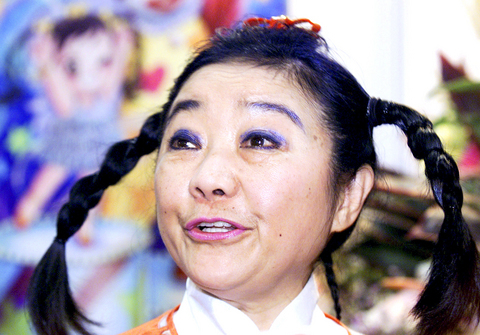Nina Wang (
Wang, whose wealth Forbes magazine estimated at US$4.2 billion this year, died of an illness, personal assistant Ringo Wong said by telephone yesterday, without giving details.
Her company, Chinachem Group (華懋集團), announced her death in a statement yesterday.

PHOTO: REUTERS
"With deep sorrow and sadness, the Chinachem Group announces the passing away of its Chairlady Mrs Nina Kung Wang," Chinachem said in the faxed statement. "Funeral arrangements will be announced shortly."
Known as "little sweetie" by the Hong Kong media for her trademark pigtail hairstyle and penchant for traditional Chinese dresses, Nina Wang won control of deceased husband Teddy Wang's (王德輝) fortune in 2005. That came after Hong Kong's highest court ruled she didn't conspire with her butler to forge the will.
Teddy Wang was kidnapped in 1983 and again in 1990. He wasn't returned after the second abduction and his body was never recovered. Nina Wang ran real estate developer Chinachem for nine years under a power of attorney, insisting her husband was alive.
Nina Wang was born in 1937. Their tale began innocently enough as childhood sweethearts in Shanghai, where their well-to-do families were bound by business ties. She followed Teddy to Hong Kong in 1955 and married him when she was 18.
During the acrimonious court battle over his estate, Nina's lawyer described their years together as almost a fairytale and said they remained madly in love into middle age.
Teddy's father, Wang Din-shin (王廷歆), told a different story. He accused Nina of having an affair and had Teddy declared legally dead in 1999 as he started his effort to gain control of his son's estate. He later said his son was so incensed that he cut Nina out of his 1968 will, leaving his inheritance to his father.
Years after Teddy vanished, Nina Wang produced a new will, which named her as the sole beneficiary. Lawyers for Nina said he wrote it in 1990 a month before he disappeared.
What happens to Nina's fortune, with the company her husband left behind making up the bulk of it, was not immediately clear. She left no children behind but has at least one brother and reportedly some other siblings.
Hong Kong media was rife with speculation yesterday about the existence, or not, of a will, and whether her siblings -- who keep an ultra-low profile -- would emerge to claim a share of Wang's wealth.
Be it her hairstyle, gaudy dress sense or immense fortune, Nina was one of Hong Kong's best-recognized women.
She openly admitted to being stingy, saying she only spent a modest HK$3,000 (US$380) each month on shopping and necessities, sometimes flashing her bargain buys to the media.
Later, she displayed a surprise streak of ambition when she announced plans to build the world's tallest skyscraper, the US$1.3 billion, 108-story Nina Tower. The government shelved the plan in 1997, citing height restrictions.
While she baulked at expensive skin-care treatments and health-giving tonics -- the staples of most wealthy Chinese women -- she was not penny-pinching when it came to protecting her billion-dollar fortune from her father-in-law.
Chinachem group boasts more than 200 properties in Hong Kong.

On Tuesday, US President Donald Trump weighed in on a pressing national issue: The rebranding of a restaurant chain. Last week, Cracker Barrel, a Tennessee company whose nationwide locations lean heavily on a cozy, old-timey aesthetic — “rocking chairs on the porch, a warm fire in the hearth, peg games on the table” — announced it was updating its logo. Uncle Herschel, the man who once appeared next to the letters with a barrel, was gone. It sparked ire on the right, with Donald Trump Jr leading a charge against the rebranding: “WTF is wrong with Cracker Barrel?!” Later, Trump Sr weighed

SinoPac Financial Holdings Co (永豐金控) is weighing whether to add a life insurance business to its portfolio, but would tread cautiously after completing three acquisitions in quick succession, president Stanley Chu (朱士廷) said yesterday. “We are carefully considering whether life insurance should play a role in SinoPac’s business map,” Chu told reporters ahead of an earnings conference. “Our priority is to ensure the success of the deals we have already made, even though we are tracking some possible targets.” Local media have reported that Mercuries Life Insurance Co (三商美邦人壽), which is seeking buyers amid financial strains, has invited three financial

Artificial intelligence (AI) chip designer Cambricon Technologies Corp (寒武紀科技) plunged almost 9 percent after warning investors about a doubling in its share price over just a month, a record gain that helped fuel a US$1 trillion Chinese market rally. Cambricon triggered the selloff with a Thursday filing in which it dispelled talk about nonexistent products in the pipeline, reminded investors it labors under US sanctions, and stressed the difficulties of ascending the technology ladder. The Shanghai-listed company’s stock dived by the most since April in early yesterday trading, while the market stood largely unchanged. The litany of warnings underscores growing scrutiny of

OUTLOOK: Among the six sub-indices, only the stock market confidence sub-index rose due to strong equity performance and expectations of a US Federal Reserve rate cut Consumer confidence weakened further this month, sliding to its lowest level in two-and-a-half years as households grew increasingly uneasy about the economic outlook, job security and big-ticket spending, a survey by the National Central University showed yesterday. The consumer confidence index fell 1.07 points from last month to 63.31, the weakest number since May 2023, said the university’s Research Center for Taiwan Economic Development (RCTED), which conducts the monthly poll. “Although the Directorate-General of Budget, Accounting and Statistics recently increased Taiwan’s GDP growth forecast for this year to 4.45 percent, consumer sentiment tells a different story,” RCTED director Dachrahn Wu